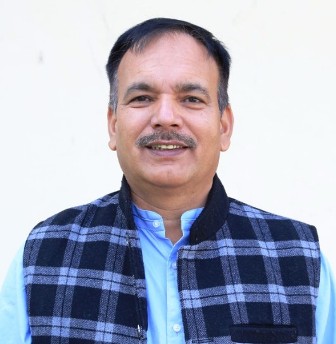Director's Message

Dr. I.D. Bhatt
Director Incharge
G.B. Pant National Institute of Himalayan Environment (NIHE)
Detailed Profile
Learning is eternal. But what we learn at what point in time is most important to us. In the changing scenario both in India and the world, bringing the positive transformation in what we learn is also critical. The traditional models of development thinking have changed owing to the requirements of aspirations of the Himalayan inhabitants and the world outside. Research for the Himalayan region not only has to prepare for creation of sustainable livelihoods but also the conservation priorities of the region. A traditional functional and discipline-oriented approach becomes outdated in this context. A dynamic wide-ranging hardcore research and hands on field demonstration is what needed to make our Institute more apt to the changing times. To solve problems of the region we need both inter-disciplinary and multi-disciplinary approach accompanied with dedication to the region. Thus, NIHE should achieve vision of knowledge creation and dissemination.
We at the Institute have to admit that with so many individual variants, like cultural and social backgrounds, individual aspirations and attitudes in the Himalayan region, there cannot be uniform strategy for regional development. We just allow it to happen in diversity of role-plays, leadership situations and individual assignments and projects, which provide wider scope for interaction with the stakeholders, and simultaneously put a premium on creativity, lateral thinking and achievements.
We believe that if we think locally and also sincerely act locally, global dimensions are implicitly taken care of in due course. Perhaps, Mahatma Gandhi would have approved of it. This will ultimately lead to local acting of one being harmonious or consistent with global thinking of another. Researches of the future are to be sensitive to these aspects of the chasm between the desirable future of the society and the present society in terms of parameters of quality and dignity of life. These concerns have to be positively embedded in the psyche and learning here at the Institute in every possible way.
A strong and proactive leader, amenable to mission and vision of the institute can guide and bring newer heights of success in terms ofresearch productivity and actionable outcomes. Emphasis on building better synergy and collective establishment of research goals among all the four thematic centres of the institute (CLWRM, CSED, CBCM and CEA&CC) and regional centres (LRC, HPRC, GRC, SRC, NERC, Mountain Division at MoEF&CC), will complement each other in achieving their individual targets.There is immense scope to undertake in-depth but transdisciplinary and multidisciplinary research and development work to address the environmental problems of IHR. Identification and strengthening of huge repository of local knowledge, their validation and integration with contemporary scientific knowledge for wider use in research and development actions of regional and national relevance. Need has also been realised to work towards development, demonstration and diffusion of technological innovations which are suitable for IHR environment, acceptable for local people and economically sustainable. The Institute cannot have resources directly to the development at scale, but can build demonstration models and provide training to manpower which can upscale these models with the grants from state and central schemes that are already being used in the region.
The on-going approach of research can be further linked to SDGs-oriented outcomes that will also be coherent with national missions under NAPCC and beneficial for socioecological systems of local, sub-regional, regional as well as entire IHR levels. Moreover, it is essential to strengthen the linkages of the research with the thematic areas of National Mission for Sustaining the Himalayan Ecosystem, viz.- natural and geological wealth ; water, ice, snow, including glaciers ; forest resources and plant biodiversity;micro flora and fauna, wildlife and animal population; traditional knowledge systems,Himalayan agriculture, social and socio-ecological systems.
The institute will support more of collaborative action-oriented research programmes with equal balance of research rigour, visibility and demonstration / manpower training as main components. As Humboldt and JSPS Fellow my support will be to facilitate scholars and students for international exposure, learning and fellowships. The collaborations will be on the core mandate of the institute with universities and institutions in IHR, other institutions in the country and with international organizations through which we could achieve some of the desired goals related to sustainable development of socio-ecological systems and environmental conservation. Internship programme will be accentuated to encourage involvement of students from all disciplines, across colleges, universities and institutes; which will provide broader perspectives on frontier issues, better understanding of society-ecology-economy interface to nurture innovation, professional excellence and problem-solving analytical ability.
Research scholars are the vital integrant of the institute. Our endeavour is always to provide a world-class environment for intellectual stimulation, fostering innovations and creative thinking, and imbibing leadership qualities with an attitude to work towards the benefits of environment and society. We also highly acknowledge the importance of ethics in scientific research and development, and honesty, integrity, risk-taking ability at personal level along with their professional competence.
Our vision for the institute in the current decade is to further take its research outcomes in a pragmatic manner for policy formulation with higher national as well as international recognition and repute. The institute encourages all visitors including community, academia, industry and policy makers, and has openness to their ideas, knowledge and suggestions to pragmatically address the development and environment concerns of IHR.
